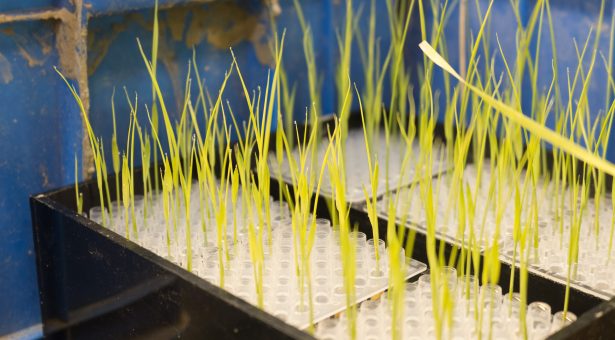International training programmes and resources

Our plant breeding training programmes are an important part of our international relationships.
For example, some of our wheat researchers have set up a number of training workshops to help international wheat scientists including four workshops around the world between 2014 and 2018. Each of the workshops trains between 15 and 20 international scientists from agricultural, crop and bioscience institutions, technology centres and universities, covering subject such as Molecular Breeding and have welcomed participants from 18 countries around the world.
The value of these courses was highlighted following one week-long training course at the BecA-ILRI hub in Kenya.
After the course, the participants asked how the BecA-ILRI hub could acquire a particular genotyping technology called KASP, a flexible platform, with the capacity of working with relatively few genetic markers from a large number of samples, making it economically viable for breeding programmes (several technologies run thousands of markers from fewer samples which is of less value for breeding programmes).
Thanks to a combination of the course and our established collaboration with the BecA-ILRI hub, it was possible to introduce KASP technology, alongside being able to send our scientists such as Oluwaseyi Shorinola to provide additional training for local scientists in its use.
KASP is now being employed to select markers for disease resistance for wheat and other crops and the BecA-ILRI 2017 Annual Report highlights that the tools have allowed local scientists to select 46 markers for disease resistance out of 3,200 over a six-month period, work that would have previously taken them 8-10 years. Resistant markers are also now being trialled in the field in Kenya.
In addition, in collaboration with BecA-ILRI Hub, the Earlham Institute and others, we have built a Bioinformatics community of practice (BiX CoP). The aim is to build a self-sustaining network to enable Africa to reap the benefits of the genomic era in improving its agricultural productivity.
An intensive eight-month bioinformatics training course was organised, incorporating Africa focussed research projects. This innovative training programme took participants on a journey from learning the basics of bioinformatics right through to leading their own research projects and becoming the trainers. This has empowered a community of African bioinformaticians, enabling them to undertake leadership roles to apply modern genomics to accelerate crop and livestock improvement in Africa.
Closer to home, we also play an active part in the Monogram Network, which brings together researchers with an active interest in small grain cereal and grass research, with expertise spanning plant genetics, physiology, pathology, breeding, and bioinformatics.
To enable researchers to extend their capabilities to wheat, a group of our scientists launched the website Wheat-Training.com in August 2016.
The website provides a practical resource aimed at helping researchers who want to work in wheat. This training resource had seen over 6,000 individual users by July 2019 with over 200 accessing the resource on a monthly basis and users coming from across the world including the UK, USA, France, Germany, China, India and Australia, Canada and Japan.
Professor Parveen Chhuneja, Director of the School of Agricultural Biotechnology at the Punjab Agricultural University was very enthusiastic about the training saying, “I find Wheat-Training.com a very good resource with a lot of highly useful information about wheat at one portal. Any researcher/student working on wheat or getting started on wheat will be greatly benefited”.
